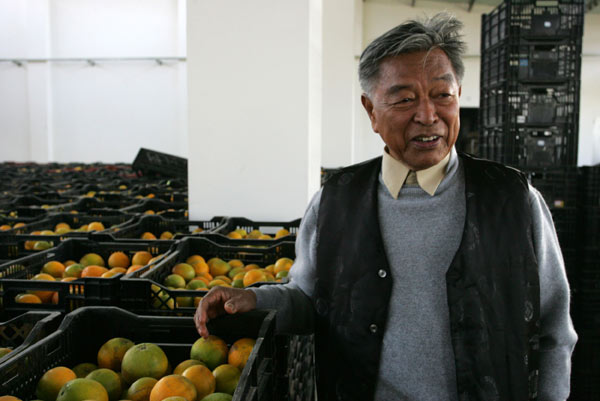'Tycoon fruits' coveted by young consumers despite high price
|
The oranges of former "tobacco king" Chu Shijian are very popular and in high demand online. Fu Xinghua / for China Daily |
A unique orange brand has become one of the most coveted fruits in China this winter, though it is sold for five times the average market price - and is invariably out of stock.
"It's not just because the fruits are exceptionally sweet and juicy," said Shi Jin, an office worker in Shijiazhuang, capital of Hebei province. "The brand has a big story behind it."
For weeks, Shi has been trying to buy the legendary "Chu's orange" from its online retailer, Benlai.com. The fruits, however, are always in short supply and sell for at least 25 yuan ($4.1) a kg, compared with an average 5 yuan per kg for ordinary oranges.
"Even when there are oranges in stock, the online store only takes orders from Beijing and Tianjin," according to Shi.
The "Chu's orange" is named after 85-year-old Chu Shijian, China's former "tobacco king" who built a struggling tobacco firm into the country's largest and most profitable cigarette producer in the 1980s. Chu, however, was jailed for life on corruption charges in 1998.
After he was released on medical parole in 2002, Chu contracted 160 hectares of wasteland in the mountains of Southwest China's Yunnan province and began to plant oranges.
Today, his fruit farm produces 8,000 metric tons of oranges a year, generating 30 million yuan in annual profits. Most of his products are sold online.
"These are not ordinary oranges. Each fruit carries Chu's story of perseverance," Shi said. "So the fruits are not just delicious, but inspiring, too."
Indeed, many buyers said they covet Chu's oranges because they respect and support him. "Our whole family respects him for his hard work and unyielding spirit," said Ke Ting, a full-time mother in Beijing.
"We bought his oranges last year and again this year," she said, explaining that the oranges tasted better than any others on sale at Beijing's markets.
However, Ke said she was particularly impressed by Chu's endurance through difficult times.
"When we traveled to Yunnan for vacation this summer, I took my son Jia Fang to visit the Hongta Group, the tobacco giant Chu built, and told him the old man's story," she said. "He was clearly moved."
Ke said she hoped her son would grow up to be strong and unbending, even if he had to suffer setbacks and failures.
Chu was not the first business tycoon to take up farming in China. Several other big-name business leaders have chosen to show their strength in agriculture.
Real estate tycoon Pan Shiyi has launched "Pan's apples", a sweet, juicy apple species grown in Northwest China's Gansu province. The apples are sold for 30 yuan per kg, six times the average apple price, but sell well at online retail outlets, including Benlai.com and Taobao.com.
Meanwhile, Liu Chuanzhi, founder of the Lenovo Group, China's PC giant, is soon to launch a quality Chinese gooseberry brand, a major product of Lenovo's new agricultural arm. The fruit will be priced at 56 yuan per kg, almost 10 times the average price for other brands.
When his company's agricultural arm was set up last year, Liu said he was optimistic about the new business, as more Chinese consumers were willing to pay a higher price for better, safer food amid growing food safety concerns.
He was echoed by Liu Shanshan, a 30-year-old Beijing white-collar worker. "The names of these business tycoons, when included in the brand names, increase consumer confidence in their quality. That's why I have chosen these expensive fruits on the Web instead of the cheaper ones sold at neighborhood stores."
Most avid buyers of "tycoon brand" fruits are young Internet jockeys in their 20s and 30s.
"My parents, however, complain that the fruits are too expensive and are not worth the price," Liu said. "It's hard to explain the brand story to their generation, who habitually economize on everything."
Xinhua

























